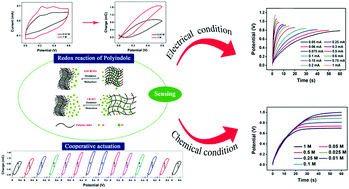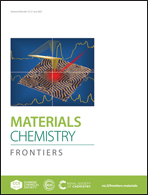Conducting polymers as bio-mimetic multistep macromolecular sensors of working conditions: polyindole/polyvinyl alcohol hybrid film senses electrical and chemical working ambient†
Abstract
Conducting polymers (CPs) can be considered as model materials for designing motors capable of sensing their own working conditions while working without additional connectivity as they mimic the electrochemical reactions of biological muscles comprising macro molecular motors. Bio-mimetic reactive sensing characteristics of polyindole (PIN) and its applicability as a multi-step macromolecular sensor of working conditions is verified for the first time using a flexible polyindole/polyvinyl alcohol (PIN/PVA) hybrid film. The sensing behaviour of the PIN/PVA film toward working electrical and chemical conditions was explored through its chronopotentiometric response in aqueous solutions of HCl by changing the reaction variables: applied current and chemical environment (electrolyte concentration) at a constant charge. The consumed electrical energy during the electrochemical reaction of the film varies linearly with the driving current and follows a logarithmic dependence of the electrolyte concentration. The reversible charge consumed during the reaction obtained from the coulovoltammogram is found to vary as a double logarithmic function of the electrolyte concentration. The electrical energy and the reversible charge consumed during the reaction act as the sensing parameters of the energetic working conditions. The cooperative actuation (the reversible conformational movement) of the PIN/PVA film by balancing the counterion concentration is also presented and a theoretical description to explain the observed result is introduced. As a result of reversible conformational movements, the polymeric chains of PIN expand/contract reversibly producing a volume change that mimics the reaction-driven volume changes taking place in biological muscles under electrical stimulus. These results of the work on PIN suggest the possibility of constructing new multifunctional devices comprised of several actuators and sensors working simultaneously driven by the same reaction and with only two connecting wires based on CPs and support the argument that the reactive sensing capability for their own working conditions is a general property of all CPs.



 Please wait while we load your content...
Please wait while we load your content...